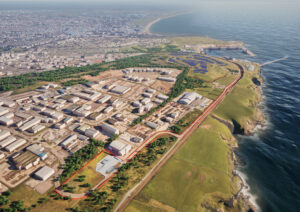Government looking at non-transport pollution sources
Government is looking at air pollution emissions from non-transport sources including diesel generators and wood-burning stoves, alongside its plan to tackle nitrogen dioxide, a minister has said.
Lord Gardiner of Kimble under-secretary of state at the Department for Environment, Food and Rural Affairs (Defra) outlined the government’s strategy for tackling air pollution yesterday evening (3 July) in a debate in the House of Lords on London’s air quality.

Lord Gardiner of Kimble, Defra minister, speaking in the Lords yesterday (3 July)
The Defra minister said that the government is currently considering responses to the consultation on its draft plan on nitrogen dioxide emissions, with a final version of the plan due to be published by 31 July.
Much of the focus of the plan is on reducing emissions from road transport, with a large part of the responsibility placed on local authorities to implement local plans to tackle air pollution in their area.
Despite some criticism of this approach, Lord Gardiner maintained the government’s commitment to ‘local solutions’ for air quality.
He said: “Our plan makes it clear that the government will work closely with local authorities to develop the right solution for their areas. We will work with them to develop and implement measures that will achieve the desired outcomes in the shortest possible time.
“The plan, and the clean air zone framework that accompanies it, will empower local authorities to make targeted interventions, ensuring that actions have an impact on those areas where nitrogen oxide emissions are highest. The main focus of the plan is tackling nitrogen dioxide but clean air zones aim to address all sources of pollution, including particulate matter.”
Non-transport
However, the minister also noted that ‘one third’ of emissions are non-transport related and are linked to emissions from non-road mobile machinery, particularly construction machinery.
He added that the government will shortly be publishing a response to its consultation on emission controls for stationary diesel generators, and praised the Mayor of London’s proposals for a low emission zone for construction equipment, which he claimed “other local authorities may wish to consider.”

Defra has carried out a consultation on emission controls for stationary diesel generators
Lord Gardiner also claimed that the government is working alongside stove manufacturers, fuel suppliers and retailers to target a reduction in emissions from the domestic burning of coal and wood, which he said “contributes between 7% to 9% of London’s fine particulate concentrations.”
The motion to hold the debate was secured by the Conservative Peer Lord Borwick, who highlighted the use of diesel generators in his opening address, as well as emissions from road transport.
He said: “For a long time big landlords have had standby diesel generators so that their trading can continue if electricity service is interrupted. Occasionally these would be started and run for a short time if only to check that they were in working order.
“An unexpected by-product of the recent rules to enable private producers to feed-in electricity into the grid is that it is apparently now economic for such department stores and office blocks to run their generators and be paid for it.”
Vehicles
Lord Borwick also described electric cars as a ‘game changer’ in tackling air pollution, and noted that latest generation of petrol and diesel vehicles are continuing to improve emissions standards.
However, the former environment minister and Labour Peer Lord Whitty, criticised the government’s approach for ‘pushing responsibility on to local authorities’.
He said: “The theme of my speech today is that it is important that the mayor’s strategy is followed through so that the zones can be expanded and enforced, but a national strategy is needed to back that up.

Lord Whitty, the former Defra minister
“The mayor’s powers are limited and the lack of a national strategy has already twice been exposed in the High Court as inadequate in terms of the Government’s responsibilities under European legislation and under their own commitments.”
Brexit
Also speaking during the debate, the Green Party Peer, Baroness Jones of Moulsecoomb argued that Brexit negotiations should take into account the enforcement of environmental obligations, including those to tackle air pollution, and called for a new regulatory body to enforce standards.
She said: “The European Commission currently has the power to fine the UK Government for failing to protect the health of their citizens. We need a replacement UK body with similar clout. The Environment Agency and Natural England are under the thumb of Defra and cannot offer the necessary protection to people or planet.
“We also need a body that can be sued by victims if it sets the bar too low or fails in its job of enforcing standards to protect human health and the natural world.”
















